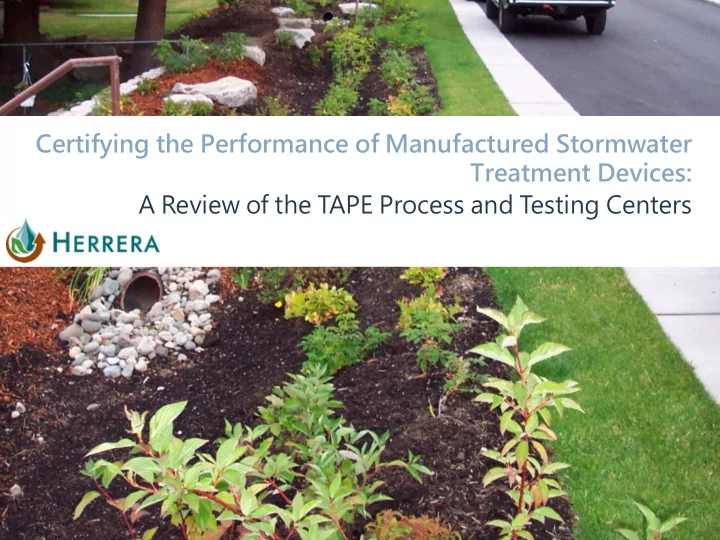

Certifying the Performance of Manufactured Stormwater Treatment Devices: A Review of the TAPE Process and Testing Centers 1
Dylan Ahearn, PhD • TAPE expert for 10+ years • Had a hand in >90% of TAPE approvals • Helped draft the 2011 and 2018 TAPE protocols 2
INTRODUCTION - Technology Assessment Protocol Ecology: TAPE - Ship Canal Test Facility - The Next Generation of Testing - STTC 3
The TAPE Protocol 4
BMP Selection Why TAPE? • Ecology sets guidance for which BMPs can be used • Specific BMPs are required for specific pollutants • Most BMPs are grandfathered in 5
The TAPE Protocol Emer erging T g Technology • Testing program first established in 2002 • Most recent revision in 2018 • Most rigorous and active testing protocol in the nation 6
The TAPE Protocol Jurisdictions t that recogn gnize T e TAPE 1. Washington 2. Oregon 3. New York 4. Virginia 5. New Hampshire 6. Rhode Island 7. Many smaller jurisdictions 7
The TAPE Protocol Cer erti tifi ficati tions • General Use – GULD - use at will • Conditional Use – CULD - install up to 10, monitor 1 • Pilot Use – PULD -install up to 5, monitor all 8
The TAPE Protocol Certif ification ion C Categorie ies • Basic – TSS • Enhanced – dissolved Cu and Zn • Phosphorus – TP • Oil – NWTPH – Oil fraction • Pretreatment - TSS 9
The TAPE Protocol External Review • Board of External Reviewers (BER) • Stormwater experts from across the United States • Stakeholders Advisory Group (SAG) • Stormwater professionals from government agencies throughout Washington State and the City of Portland, OR 10
The TAPE Protocol The Process ~ 3 years BER Review Submit Receive App. P/CULD BER BER Find Potential Field Site Review Review Prepare Receive QAPP Prepare Finalize QAPP TER Approved GULD Site Evaluate Site Field Evaluation 11 11 11
The TAPE Protocol Current TAPE Program • Currently about 15 treatment technologies active in the TAPE program, at various stages: • Initial application • QAPP being reviewed • Monitoring underway • TER being reviewed • 13 technologies with a current basic treatment GULD 12 12
BMP Selection Dept of Ecology Approved MTDs (TSS removal) • Contech StormFilter (perlite, ZPG, Phosphosorb) • Contech Filterra (normal, bioscape) • Oldcastle Perk Filter • Watertechtonics EcoStorm Plus • BioClean Modular Wetland System • Baysaver BayFilter • WSDOT Media Filter Drain • WSDOT compost amended swale • Oldcastle BioPod 13
The TAPE Protocol Future of TAPE • TAPE approval accepted in various municipalities around the country • A model for a national certification protocol – Stormwater Testing and Evaluation for Products and Practices (STEPP) Nationally recognized testing protocol 14 14
The TAPE Protocol What D t Does es T TAPE M E Monitoring L Look Like ke? 15
The TAPE Protocol • Continuous Flow Monitoring • Collect flow-weighted composite samples 16
The TAPE Protocol Rigo gorous A Accep eptance Crite teria 17
The TAPE Protocol Rigo gorous A Accep eptance Crite teria 18
The TAPE Protocol Parameter eters 19
The TAPE Protocol 20
The TAPE Protocol Storm volume = 1300 cf Pacing = 100 cf Samples = 13 Coverage = 100 % Q Tim Time y = 3E-05x - 0.0223 MP8 IN R 2 = 0.7929 3 2.8 2.6 2.4 2.2 2 Storm Depth (in) 1.8 1.6 1.4 1.2 1 0.8 0.6 0.4 0.2 0 0 10000 20000 30000 40000 50000 60000 70000 80000 90000 100000 Influent volume (cf) 21
The TAPE Protocol Basic T Treatme ment 80% removal of TSS (influent = 100 to 200 mg/L) 20 mg/L TSS effluent goal (influent <100 mg/L) Enhanc nced T d Treatment Influent dissolved copper range = 0.003 to 0.02 mg/L Influent dissolved zinc range = 0.02 to 0.3 mg/L 30% reduction of dissolved copper 60% reduction of dissolved zinc Phospho phorus us T Treatment Influent total phosphorus range = 0.1 – 0.5 mg/L 50% reduction of total phosphorus Oil T Trea eatment Influent >10 mg/L Daily average TPH <10 mg/L Maximum TPH discrete (grab) sample <15 mg/L No visible sheen 22
The TAPE Protocol Performance at Specific Flow Rates • Meeting performance goals must occur at 100% to get approved at your desired design flow rate 23
The TAPE Protocol Labor a and Tech I Inten tensive • $15,000 equipment • $200,000 total cost 24
Ship Canal Test Facility 25
Overview • Built 2001 2001 • 31.6 6 acre b e basi sin • 22.7 7 acres i es imper pervi vious • 8.9 acres r es roadsi dside l e land ndsc scaping • 1,980 g 80 gpm pm = = 6 6-month s h storm 26
Four Test Bays 27
28
Draw-Pipe 29
Four Test Bays 30
Flow Splitter 31
Flow Splitter 32
Valve Splitter 33
Bay 1 Planview 34
Flow Measurement 35
Sample Collection 36
The Brains 37
Influent Chemistry Parameter Units Influent TSS mg/L 73.1 TP ug/L 151 D Cu ug/L 15.2 D Zn ug/L 49.2 NO3 ug/L 373 PSD clay % 28 PSD silt % 35 PSD sand % 37 D50 uM 21 38
Stormwater Technology Testing Center 39
Stormwater Technology Testing Center
Sou ource W e Water • Drainage area: ~1,000 acres • Land use: high traffic highway and mixed urban • Divert flows from 84 inch storm drain along I-205 at Columbia Slough • Flows • Peak = 25 cfs (1/2 – 2 yr); 660 cfs (100 yr) • Utilize existing 36 inch diversion and 6 foot manhole
Di Diversion S Structure Sediment flows both ways at diversion
Si Site D e Desi esign • Simultaneously test three systems • Three 14 X 17 foot test bays • Both Gravity and Pumped Conveyance! • AODD Pumps = Flow Meters • Positive Displacement • PLC counts pump cycles to calculate flow rate
Si Site D Design
Si Site D Design
Si Site D Design
Recommend
More recommend